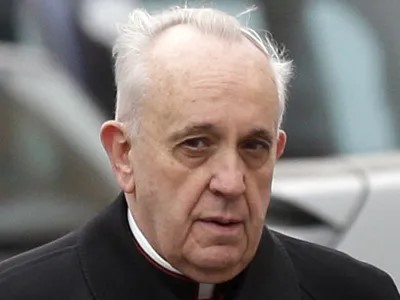José Maria C.S. André
I’m beginning to think “maybe”. A few days after Cardinal Bergoglio was elected Pope, Mariano Fazio published a little book “El Papa Francisco” (Pope Francis), indicating the main lines of his thought and including, as an appendix, a short letter he addressed to the clergy of his diocese. I lost the book, but didn’t forget the letter, until I found again a copy of the book at a friend’s house and decided to re-read the letter on the Internet.
I put a lot of effort into looking for it, searching in various search engines with different words. I found references, but they were inactive. I didn’t give up. I tried more search engines and searched with different words, until… finally! There it was, on the website of the Pontifical Council for the Pastoral Care of Migrants and Itinerant People:
After all, the Internet has almost everything! Even if some things are very difficult to find!
The letter contains ideas that the Pope has repeated, especially in recent months, but that first text has a special flavour of freshness for me.
The theme is prayer. The style is that of a short letter to friends: “I am not sure why I felt a strong impulse today [to write it]. At first, I asked myself ‘do I pray?’ and the question has passed [to you]: do we pray? Do we pray enough? How much is needed? I had to answer myself. As I address the question to you now, my wish is that each of you will also answer from the depth of your heart.”
That’s how this letter begins:
Cardinal Bergoglio recognizes the merit of his collaborators in the diocese: “I think we can objectively say that we are not idle. (…) On the other hand, we bear the weight, if not the anguish, of a pagan civilization that proclaims its principles and its decadent ‘values’ with such insolence and assurance (…). So, between the intense and exhausting apostolic work and the aggressively pagan culture, our hearts shrink into a practical impotence that leads us to the minimalist attitude of surviving trying to preserve the faith. However, we are not fools and we realize that something is missing (…). Do we want to do everything by ourselves?”
“I have spoken several times of ‘parresia’ [a Greek word, much repeated in the Acts of the Apostles, which means daring, audacity], of courage and fervour in our apostolic action. The same attitude should apply to prayer: praying with ‘parresia.’ Do not rest on having asked once; Christian intercession takes all our insistence to the limit. That is how David prayed when he asked for his dying son (2 Sam 12:15-18), that is how Moses prayed for the rebellious people (Ex 32:11-14; Num 4:10-19; Deut 9:18-20), putting aside his own comfort and personal gain (…) (Ex 32:10): he didn’t trade his own comfort and personal gain (…) (Ex 32:10). 32:10): he didn’t switch sides, he didn’t sell out his people, but fought to the end. (…) Like Abraham, we must bargain with God (…) with true courage (…) (cf. Ex 17:11-13). Intercession is not for wimps. We don’t pray ‘to observe a rule’.”
“Jesus is clear in the Gospel: ‘Ask and it will be given to you, seek and you will find, knock and it will be opened to you’ and, so that we understand well, he gives us the example of the man who won’t let go of his neighbour’s doorbell at midnight until he gives him three loaves of bread (…). And if we talk about being inopportune, look at that Canaanite woman (Mt 15:21-28), who risked being run down by the disciples (v.23) and being called a ‘dog’ (v.27) (…). This is a woman who knew how to fight courageously in prayer.”
The letter develops the topic with suggestive examples, sometimes with a provocative sense of humour, calling on its collaborators to exchange human security for trust in God. “This is not our fight, but ‘God’s war’ (2 Chron 20:15); and may this move us to give more time to prayer every day.”
In this Year of Prayer, I really needed to find this letter. And I did!
(Image: Jorge Mario Cardinal Bergoglio, who went on to become Pope Francis.)


 Follow
Follow


